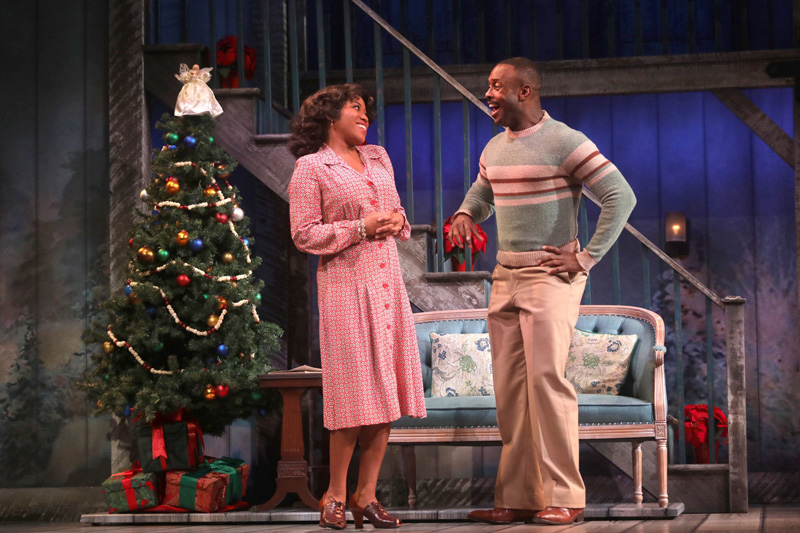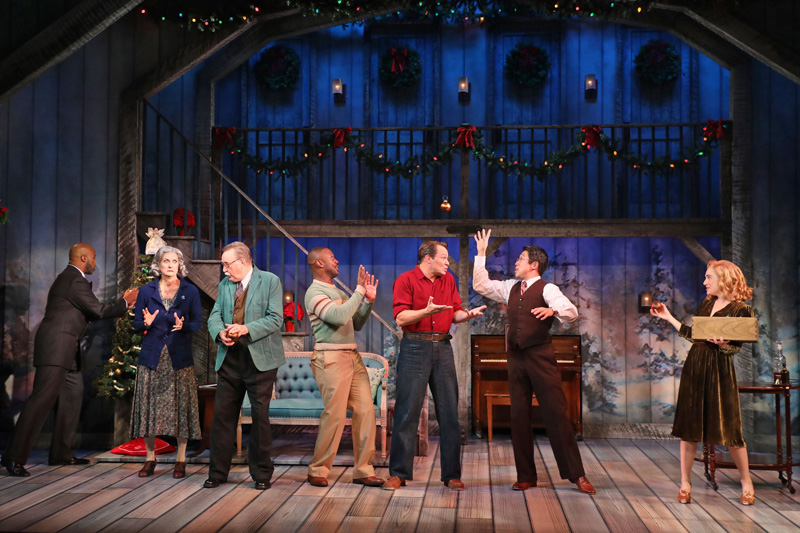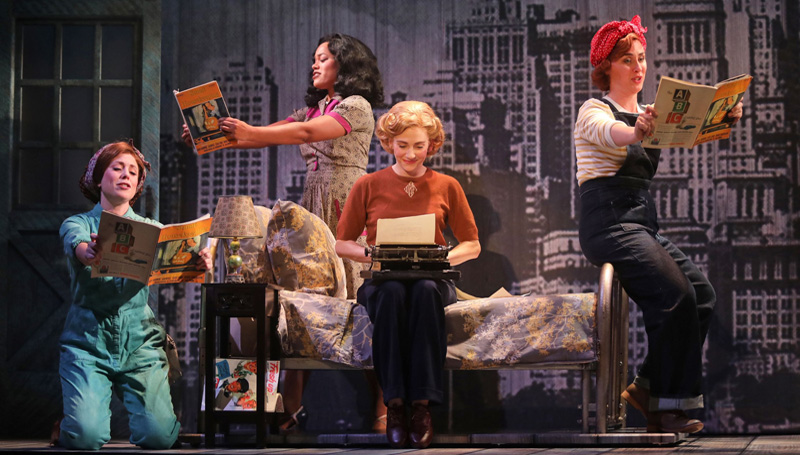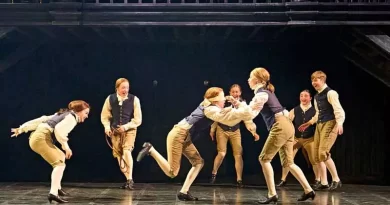“Christmas in Connecticut”, Goodspeed Opera House
Robert Schneider in East Haddam, Connecticut
9th January 2023
The book writers of the new musical Christmas in Connecticut say in a programme note that they “fell in love” with the eponymous 1945 Warner Brothers movie “the first time they saw it.” What’s more, they discerned “contemporary resonances” in this story of an unmarried, urban sophisticate who pretends in print to be a happy homemaker, wife and mother only to learn that to keep her job she’ll have to play the role for real over a Christmas holiday.

Photo credit: Diane Sobolewski.
Now, if you fall in love with something and you think it speaks to the modern age, why not leave it alone? Instead, the creators have injected still more contemporary resonance until, like Botox, it completely distorts the face it’s meant to beautify. Christmas in Connecticut at the Goodspeed Opera House is a hydra-headed evening of musical theatre that never stops apologizing for the charming and unpretentious comedy that inspired it.
To make good my claim, I need to describe the film: after Navy Commander Jefferson Jones’ destroyer is torpedoed, he spends 18 days on a life raft. A nurse in the hospital where he’s treated calls in an old debt from a publisher of women’s magazines to get Commander Jones invited to a Christmas feast at the Connecticut home of his star columnist, Liz Lane.
The publisher is enchanted with this idea and invites himself to the feast as well. Unbeknownst to him, Liz Lane is a fraud. Her cooking expertise is borrowed from a friend, a Hungarian restaurateur named Felix Bassenak. The Connecticut farm actually belongs to an overbearing architect, John Sloan, who’s been pestering Liz to marry him. Rather than lose her job and see her editor loose his, Liz reluctantly accepts John’s proposal so she can play the perfect hostess in his perfect home. She brings Felix along to cover for her in the kitchen and borrows a succession of babies from mothers who work in nearby defence plants.

Photo credit: Diane Sobolewski.
Afficionados of the form should be able to fill in the rest for themselves: Liz manages to delay the wedding three times, dupe the publisher and fall in love with Commander Jones. Much of the intrigue emerges from the young couple’s visible infatuation and Liz’s corresponding irritation at being forced to play at being a married woman and a mother—although she’d happily be those things if she were part of Jones’ life instead of Sloan’s. Felix and Nora, Sloan’s Irish housekeeper, provide byplay as they compete in the kitchen. The whole thing goes by lickety-split as Liz and her friends scramble to keep up multiple and sometimes conflicting deceptions.
Eighty years later, movie meets musical. Book writers Patrick Pacheco and Erik Forrest Jackson have given Liz a backstory, beginning the play with her arrival in New York as a young journalist intent on working for a living. They’ve gotten rid of Sloan and nixed the romance with Commander Jones, who’s now an army man, a hero with a perfectly risible war wound (“the bullet only grazed me”).
Liz’s romance is now with a new character, Victor Beecham, a socialist labour agitator who lives—for reasons that are never adequately explained—in bucolic splendor on a Connecticut farm he rents from Liz’s editor.
In true, rom-com fashion, they take an immediate disliking to one another. Director Amy Anders Corcoran has cast a Black actor as the wounded soldier (the sweet-voiced Josh Breckenridge) and the production labours to provide a Black woman to pair him up with, another new character (played winningly enough by Rashida Scott) who works as a fact-checker at the magazine and so threatens to uncover the truth. It looks as if the musical is eager to embrace diversity but not to the point of miscegenation.

Photo credit: Diane Sobolewski.
Piling on the romance, Felix (James Judy) and Nora (Tina Stafford) discover each other in the kitchen while Liz’s editor (who’s also come to the farm) and an old schoolmate (another new character) are introduced as a gay couple. This obligatory bit of “contemporary resonance” actually makes the musical seem creakier. It’s all the more regrettable because the excised character of Sloan (in Reginald Gardiner’s performance) came off as a deeply closeted careerist creep who felt nothing for Liz and courted her only to add to his collection of beautiful objects. Sloan provided a lurking menace in the film that’s sorely needed amidst the avalanche of impending romances in the musical. Isn’t always making the gay characters sweet just another stereotype?
While the first act of the musical convincingly captures the screwball antics of Liz’s predicament, the second is burdened with endless contrivances needed to get everybody paired up. There’s no central romance anymore. As the play loses focus, something light and charming becomes fretful and calculated, the opposite of giddy.
The songs (music by Jason Howland, lyrics by Amanda Yesnowitz) help a little, but very few of them advance the action, exceptions being “A Capital Idea” in the first act and “Catch the Ornament” in the second. Most simply illustrate the emotion of the moment. They’re harmless in themselves but put brakes on the story. Liz and Victor finally get a duet late in the second act: “Morning Chores / Before I Met Her.” Before it can happen, however, Victor has to be roughed up by the workers he’s trying to organize and subsequently moderate his political convictions. I’m guessing that this was deemed necessary because a confirmed socialist could never fall for an apostle of consumerism.
As Liz, Audrey Cardwell is perky and upbeat. She sings well until she turns up the volume (at which point she tends to go sharp). As Victor, Matt Bogart looks like he wishes he were somewhere else, perhaps in a musical with a credible role for him.
Herin Kaputkin’s costumes are attractive in themselves, appropriate to the period and flattering to the performers, especially Ms. Cardwell. The scenery by Lawrence E. Moten III fills the small stage well and provides the staircase and the row of bedroom doors that Pacheco and Jackson’s book require. The Goodspeed is not a happy space for a lighting designer, but Rui Rita does a credible job under the circumstances.
Ms. Yesnowitz’s lyrics frequently criticize Liz’s readers for wanting to be homebodies instead of pursuing careers, but haven’t these women been working double shifts in defence plants for four years? Under those circumstances, their desire to have a family and live in the suburbs is understandable.
A final note: it may be churlish of me to ask, but with heating fuel rationed and snow drifts outside, why does everybody leave the front door gaping wide open? What is it about musicals that so divorces people from reality? And why does the reality of the past require so much jiggering, adjusting and jollying up for the stage of today?









